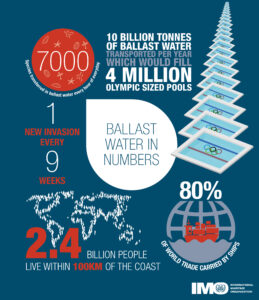A national workshop held in Lima, Peru aims to equip government officials with the knowledge and skills needed to implement and enforce IMO’s Ballast Water Management Convention (BWM Convention).
The BWM Convention is intended to prevent the spread of harmful aquatic organisms from one region to another in ships’ ballast water, which is taken on board ships for stability.
Thirty-four officials received IMO training on the BWM Convention and related Guidelines; obligations of Parties under the Convention; compliance monitoring and enforcement for port State control; and risk mitigation.
Through presentations, group discussions and role-play exercises, the aim was to strengthen Peru’s national capacity for effective implementation and enforcement of the Convention. Peru ratified the BWM Convention in 2016.
The BWM Convention entered into force in 2017, representing a significant step towards protecting the marine environment, by preventing the transfer of invasive aquatic species by ship. The Convention requires all ships to manage their ballast water and sediments to a certain standard, according to a ship-specific management plan. All ships must also carry a Ballast Water Record Book and an International Ballast Water Management Certificate.
The workshop was organized by IMO and hosted by the General Directorate of Captaincies and Coast Guard, National Maritime Authority and delivered through IMO’s Integrated Technical Cooperation Programme (ITCP).
Ballast water management – the control of harmful invasive species
Ballast water may be taken onboard by ships for stability and can contain thousands of aquatic or marine microbes, plants and animals, which are then carried across the globe. Untreated ballast water released at the ship’s destination could potentially introduce a new invasive marine species. Hundreds of such invasions have already taken place, sometimes with devastating consequences for the local ecosystem.
The International Convention for the Control and Management of Ships’ Ballast Water and Sediments (BWM Convention) was adopted in 2004 to introduce global regulations to control the transfer of potentially invasive species. With the treaty now in force, ships need to manage their ballast water.

Status of the BWM Convention
The BWM Convention entered into force on 8 September 2017.
BWM treaty requirements
Under the Convention, all ships in international traffic are required to manage their ballast water and sediments to a certain standard, according to a ship-specific ballast water management plan. All ships have to carry a ballast water record book and an international ballast water management certificate. The ballast water management standards are being phased in over a period of time. New ships must meet the ballast water treatment standard. Existing ships should exchange ballast water mid-ocean but they will need to meet the ballast water treatment standard by the date of a specified renewal survey. Eventually, most ships will need to install an on-board ballast water treatment system.
The BWM Convention requires that ballast water management systems used, to comply with the Convention, must be approved by the Administration taking into account the Guidelines for approval of ballast water management systems (G8).
IMO executed the GEF-UNDP-IMO GloBallast Partnerships Programme (2008-2017) to sustain the global momentum in tackling the ballast water problem and to catalyse innovative global partnerships to develop solutions. Click here to reach the official Website.
The GloBallast Story (download the PDF) outlines the key achievements of the GloBallast Partnerships Programme, executed by IMO in collaboration with the Global Environment Facility (GEF) and the United Nations Development Programme (UNDP). The project closed in June 2017. It was launched in 2007 after an initial 4-year phase and has been assisting developing countries to reduce the transfer of harmful aquatic organisms and pathogens in ships’ ballast water and implement the IMO Ballast Water Management (BWM) Convention.




